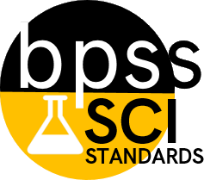BPS District Science Standards Book
K-8 Grade Levels
Grade 06 (MS-Physical Sci)
6th Grade Physical Science
"I can ... statements"
 In 6th grade Physical Sciences, the middle school level focus on students developing understanding of several scientific practices. These include developing and using models, planning and conducting investigations, analyzing and interpreting data, using mathematical and computational thinking, and constructing explanations; and to use these practices to demonstrate understanding of the core ideas. Students are also expected to demonstrate understanding of several of engineering practices including design and evaluation.
In 6th grade Physical Sciences, the middle school level focus on students developing understanding of several scientific practices. These include developing and using models, planning and conducting investigations, analyzing and interpreting data, using mathematical and computational thinking, and constructing explanations; and to use these practices to demonstrate understanding of the core ideas. Students are also expected to demonstrate understanding of several of engineering practices including design and evaluation.
SCI-MS.PS1 DCI:
[PS1] Matter and Its Interactions
-
- SCI-MS.PS1.01 Develop models to describe the atomic composition of simple molecules and extended structures.
- SCI-MS.PS1.02 Analyze and interpret data on the properties of substances before and after an interaction has occurred to determine if a chemical reaction has occurred.
- SCI-MS.PS1.03 Gather and analyze information to describe that synthetic materials come from natural resources and impact society.
- SCI-MS.PS1.04 Develop a model that predicts and describes changes in particle motion, temperature, and state of a pure substance when thermal energy is added or removed.
- SCI-MS.PS1.05 Develop and use a model to describe how the total number of atoms does not change in a chemical reaction and thus mass is conserved.
- SCI-MS.PS1.06 Design a project to construct, test, and modify a device that either releases or absorbs thermal energy by chemical processes.
- SCI-MS.PS1.01 Develop models to describe the atomic composition of simple molecules and extended structures.
SCI-MS.PS2 DCI:
[PS2] Motion and Stability: Forces and Interactions
-
- SCI-MS.PS2.01 Apply Newton's Third Law to design a solution to a problem involving the motion of two colliding objects.
- SCI-MS.PS2.02 Plan an investigation using Newton's First and Second Laws to provide evidence that the change in an object's motion depends on the sum of the forces on the object and the mass of the object.
- SCI-MS.PS2.03 Interpret data to determine the factors that affect the strength of electric and magnetic forces.
- SCI-MS.PS2.04 Use evidence to support the claim that gravitational interactions are attractive and depend on the masses of interacting objects.
- SCI-MS.PS2.05 Conduct an investigation to provide evidence that fields exist between objects exerting forces on each other even though the objects are not in contact.
- SCI-MS.PS2.01 Apply Newton's Third Law to design a solution to a problem involving the motion of two colliding objects.
SCI-MS.PS3 DCI:
-
- SCI-MS.PS3.01 Construct and interpret graphical displays of data to describe the relationships of kinetic energy to the mass of an object and/or the speed of an object.
- SCI-MS.PS3.02 Using a model describe how the different amounts of potential energy in a system changes when the object's distance changes.
- SCI-MS.PS3.03 Apply scientific principles to design, construct, and test a device that either minimizes or maximizes thermal energy transfer.
- SCI-MS.PS3.04 Investigate to determine the relationships among the energy transferred, the type of matter, mass, and change in the average kinetic energy of the particles as measured by the temperature of the sample.
- SCI-MS.PS3.05 Construct and present arguments to support the claim that when the kinetic energy of an object changes, energy is transferred to or from the object.
- SCI-MS.PS3.01 Construct and interpret graphical displays of data to describe the relationships of kinetic energy to the mass of an object and/or the speed of an object.
SCI-MS.PS4 DCI:
[PS4] Waves and Their Applications in Technologies for Information Transfer
-
- SCI-MS.PS4.01 Use mathematical representations to describe a simple model for waves that includes how the amplitude of a wave is related to the energy in a wave.
- SCI-MS.PS4.02 Develop and use a model to describe that waves are reflected, absorbed, or transmitted through various materials.
- SCI-MS.PS4.03 Evaluate how different forms of technology utilize different signals.
- SCI-MS.PS4.01 Use mathematical representations to describe a simple model for waves that includes how the amplitude of a wave is related to the energy in a wave.
SCI-MS.ETS1
[ETS1] Middle School Engineering Design
-
- SCI-MS.ETS1.01 Define the criteria and constraints of a design problem with sufficient precision to ensure a successful solution, taking into account relevant scientific principles and potential impacts on people and the natural environment that may limit possible solutions.
- SCI-MS.ETS1.02 Evaluate competing design solutions using a systematic process to determine how well they meet the criteria and constraints of the problem.
- SCI-MS.ETS1.03 Analyze data from tests to determine similarities and differences among several design solutions to identify the best characteristics of each that can be combined into a new solution to better meet the criteria for success.
- SCI-MS.ETS1.04 Develop a model to generate data for iterative testing and modification of a proposed object, tool, or process such that an optimal design can be achieved.
